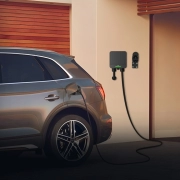How to Install EV Charging Stations in Residential Areas
With the rapid proliferation of EVs and the emphasis placed on sustainable transportation, convenient charging solutions have become even more critical than before. One frequently asked question in this regard: Can an EV be charged in residential areas? As our world transitions towards new energy sources, electric vehicle sales have seen an exponential surge. As more commuters rely on them daily for daily commuting purposes, home charging stations offer convenient and efficient methods of charging electric cars.
What Is A Residential EV Charger?
A residential EV charger also referred to as a “car charger for home”, allows electric vehicle owners to conveniently recharge their EV in their residential spaces instead of making frequent visits to public charging stations for charging purposes. A residential EV charger meets this demand while offering practicality and efficiency in fulfilling its role of meeting each vehicle owner’s charging needs efficiently and cost-effectively.
How Do Residential EV Chargers Work?
The electric vehicle adoption surge has revolutionized how we look at transportation within an ever-evolving energy landscape, changing how we perceive transportation solutions altogether. As more rely on them for daily commutes, accessibility for efficient charging solutions becomes crucial; which begs the question, “How exactly do residential EV chargers function and contribute to supporting an expanding electric vehicle ecosystem?.”
Understanding Residential EV Chargers
Residential EV chargers are key elements of electric vehicle infrastructure. As more people purchase electric cars and opt to charge them at home, home chargers have become part of modern life.
Now let’s delve into how residential EV chargers function within this broader ecosystem for charging electric vehicles.
1. Establishing the Power Connection.
Residential EV chargers operate by connecting directly to the electrical supply in a home and typically come equipped with their onboard charger that converts AC from the home’s electrical system into DC suitable for charging the battery of the vehicle. Typically the input of such chargers is measured in Kilowatts (kW), reflecting their ability to provide energy efficiently to vehicle battery packs.
2. Types of Residential EV Chargers.
There are generally two main categories of residential electric vehicle chargers: Level 1 and Level 2.
Level 1 chargers are typically included as standard with electric vehicles and operate through standard household electrical outlets supplying 120V electricity; they’re convenient for overnight charging needs while having slower charging rates than Level 2.
Level 2 chargers offer faster charging capabilities and are frequently installed within homes. Requiring only 240-volt electrical supplies for proper functioning and offering higher power levels that result in quicker charge times, these Level 2 chargers allow homeowners to meet the demand for faster and more convenient charging inside their own homes.
3. Installation Process.
Connecting an EV charger to one’s residential electrical system involves hooking it up directly, while homeowners should consult with an accredited electrician for best practice installation procedures and compliance issues. Usually, this involves adding dedicated circuits/breakers for higher power levels such as Level 2 chargers. Afterward, mounting it securely at an accessible and ventilated location ensures maximum access for drivers as well as proper ventilation for ventilation needs.
4. Charging Protocols.
Residential EV chargers adhere to specific charging protocols designed to make them compatible with different electric vehicle models, with SAE J1772 and the Combined Charging System (CCS) among the more popular examples. These protocols cover physical connectors and communication methods between charger and vehicle for an effortless charging experience.
5. Smart Charging Features.
Many modern residential EV chargers include smart charging features to allow users to monitor and manage the charging process remotely using smartphone apps or connected devices, including scheduling charging times, monitoring energy use, and receiving updates regarding charging status notifications. Such functionality contributes to greater user convenience as well as energy management.
As electric vehicles increasingly play an integral part of daily life, residential EV chargers play an essential role in transitioning towards sustainable and eco-friendly transportation solutions. Charging at home meets the unique charging needs of electric vehicle owners while contributing towards our larger goal of decreasing carbon emissions for a cleaner future.
Can Electric Vehicle Charging Stations Be Installed in Residential Areas?
Yes, installing electric vehicle charging stations in residential areas is both possible and increasingly encouraged. Homeowners and communities understand the significance of adopting sustainable practices such as installing charging stations to further this cause.
Homeowners and residential communities alike can install charging infrastructure that facilitates private charging stations on their properties; further, installing electric vehicle charging stations opens up opportunities for electric vehicle adoption while creating an EV-friendly environment.
What residential EV charger should I get?
Selecting an ideal home EV charger for electric vehicle owners looking to optimize their charging experience at home can be challenging due to so many available models from different EV charger manufacturers with various features and specifications, making choosing one essential in meeting all your charging needs based on factors like model year, charging requirements and budget considerations. Here, we discuss factors you must keep in mind when searching for residential charger options such as station types available and associated costs.
What Types of Residential EV Charging Stations Exist?
mes To choose an optimal residential EV charger, it’s critical to understand all available options. Level 1 and Level 2 chargers are two primary forms of charging stations used at homes for electric vehicles.
Residential electric vehicle chargers generally fall into two categories, Level 1 and Level 2. While Level 1 portable chargers, which operate with a standard household voltage of 120V, are essential and usually come included when buying an EV car; although suitable for overnight charging purposes they may need to meet faster charging demands for daily commuting purposes.
Level 2 chargers work at higher voltages (typically 240 V). They offer greater efficiency and quicker charging speeds for daily charging needs in residential environments, providing homeowners with more versatile yet effective charging solutions.
The choice between Level 1 and Level 2 chargers depends heavily upon personal preferences, lifestyle needs, and frequency of electric vehicle use. While Level 1 chargers tend to be simpler and more portable, ideal for occasional usage, so are sometimes better.
Level 2 chargers offer more robust and faster charging experiences, making them popular choices among homeowners who regularly need EV charging solutions at home. Understanding the features and differences between residential EV charging stations empowers EV owners to make an informed decision that aligns with their specific charging needs while improving the charging experience in their home environment.
Factors to Keep in Mind when Selecting a Residential EV Charger
1. Charging Speed and Power.
Charging speeds for residential EV chargers should be given careful thought, particularly if your commute or activities entail frequently using it for various activities such as golf. A Level 2 charger with higher amperage charging capabilities would likely meet those needs more effectively than an inferior version would do; understanding your car’s charging capabilities can also assist in selecting an optimal charger that satisfies those demands.
2. Cost of Electric Car Home Charging Station.
Understanding the total costs involved with residential EV chargers is of utmost importance. While Level 1 chargers typically come included when purchasing an electric vehicle, Level 2 charging capabilities often incur extra expenses due to faster charge speeds. You should factor in installation charges, equipment expenses, and potential electrical upgrades when considering these factors as part of total expenses.
3. Installation Considerations.
One important consideration in designing the perfect charging solution is ease of installation. Level 1 chargers can easily plug into standard household outlets while Level 2 may require professional setup or upgrade for their higher voltage levels – thus necessitating an assessment of installation requirements and associated costs to create a seamless solution.
4. Compatibility With Your Electric Car.
Not all residential EV chargers are universally compatible with every electric car model available today, making it essential to select an EV charger specifically designed or certified to work with yours. Manufacturers frequently provide compatibility lists or tools on their websites to make this easier for consumers.
5. Smart Charging Features.
Exploring smart charging options adds another convenient element to the residential EV charging experience. Smart chargers typically feature remote monitoring capabilities, scheduled charging capabilities, and integration with mobile apps – these features enable you to optimize charging times while monitoring energy use and remotely oversee the charging process.
6. Charging Station Portability.
You should keep the portability of your charging station in mind, particularly if you plan to relocate or have multiple residences. Level 1 chargers tend to be more portable as they use standard outlets; level 2 chargers require installation but provide faster, more effective charging solutions at fixed locations.
Selecting an ideal residential EV charger requires careful evaluation of both your needs and preferences. From Level 1 chargers that offer convenience to Level 2 models that boast more efficiency, understanding all factors discussed–charging speed, cost, installation requirements, compatibility requirements, smart features, and portability—is key to making an informed choice.
As more electric vehicles enter the mainstream market, residential EV charger options continue to broaden. By taking into account certain key criteria and matching them up with your charging requirements, it should become much simpler to select an ideal residential EV charger that serves all your daily charging needs while enriching the ownership experience of owning an electric car.
Installation of Electric Vehicle Charging Stations in Residential Areas
Establishing electric vehicle charging stations in residential areas involves following a precise process designed to guarantee their safety, compliance, and optimal functionality. Step one in this endeavor should involve assessing electrical capacities within each residential neighborhood to ascertain whether their electrical grid can support such infrastructure.
After considering these key considerations, other aspects such as number, location, and installation come into play: certified electricians should adhere to local regulations when installing electric vehicle charging stations in residential areas while collaboration among homeowners and community properties ensures a seamless installation process. Also important: conducting an in-depth site assessment.
1. Conduct a detailed site assessment:
Locations should be chosen carefully according to parking accessibility and proximity of electrical infrastructure, with future expansion potential and adoption rates of electric cars considered when making decisions on the placement of charging stations in residential areas.
2. Consult Local Authorities:
Seek early engagement with local authorities to understand zoning regulations, permitting processes, and any specific EV charging installation requirements that might exist in their region. Once these have been understood, get approvals/permits as necessary, to comply with local regulations.
3. Select The Appropriate Charging Stations for Installation:
Initiate early dialogue with local authorities to understand zoning restrictions, permitting processes, specific installation requirements, etc & attain necessary approval/permits as required in compliance with local legislation.
Assess expected demand and usage patterns before selecting suitable EV charging stations for residential areas. Things such as speed of charging, connectivity options, and compatibility with various electric vehicle models must all be taken into consideration before choosing an optimal station.
4. Electrical Infrastructure Assessment:
Conduct an assessment of existing electrical infrastructure to establish its capacity to support electric vehicle charging stations. Collaborate with licensed electricians to evaluate any necessary upgrades to meet charging station specifications.
5. Secure Funds and Resources:
Establish an accurate budget that addresses equipment costs, installation expenses, and potential infrastructure upgrades. Investigate funding options available through government grants and utility providers for upgrades or incentives to expand infrastructure upgrades.
6. Select strategically-situated charging sites:
1. Select Specific Locations within Your Residential Area mes mes mes and parking spaces specifically designated for electric vehicle charging are conveniently placed nearby for optimal convenience.
7. Installation by Certified Professionals:
Engaging certified electricians or specialist EV charging station installers for installation. Adhering to industry regulations will guarantee safety, functionality, and longevity in charging station installation.
8. Provide access and user-friendliness:
2. Designate parking spots that are easily accessible and marked; create prominent signage with clear instructions that guide users through charging; this ensures an effortless user experience.
9. Implement smart charging solutions:
Consider installing smart charging solutions that enable users to remotely monitor and manage charging sessions via features like mobile apps, real-time data tracking, and payment options, these features increase the efficiency and accessibility of EV charging stations.
10. Regular Maintenance and Upkeep:
Set up a maintenance schedule for EV charging stations that ensures regular inspection and servicing to protect them against issues and reduce downtime.
Conclusion
This comprehensive guide explores all facets of residential EV charging – including their concept, operation, and type, providing insight into installation processes as well as providing encouragement for installing charging stations within residential areas to foster more eco-friendly transportation practices and create a greener future.
As electric cars increasingly integrate themselves into daily life and living situations alike, residential EV chargers play an essential part in supporting eco-friendly and more sustainable transportation practices for a cleaner future.






Leave a Reply
Want to join the discussion?Feel free to contribute!